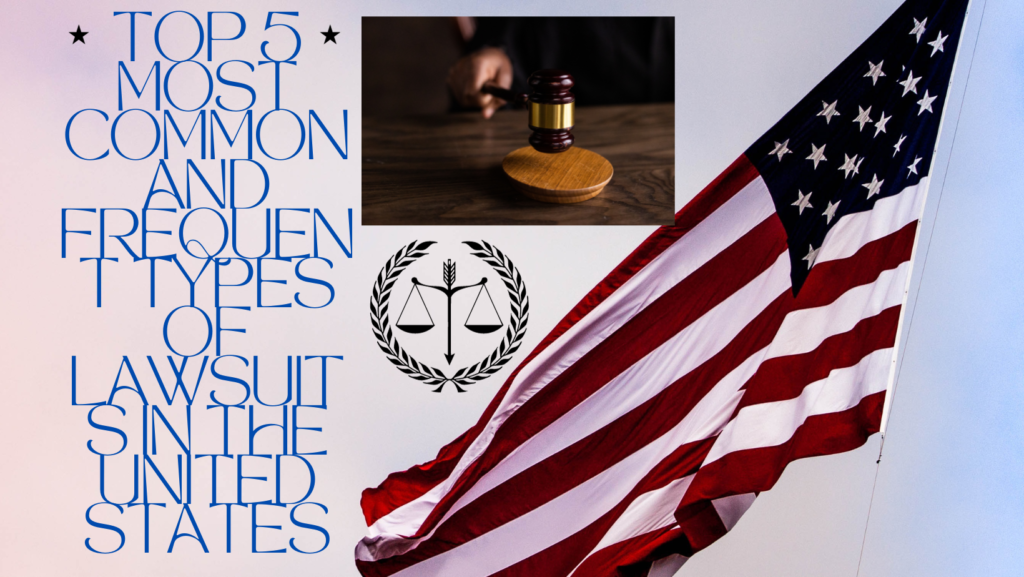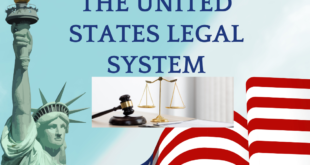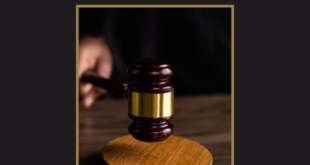
Lawsuits in the United States are a vital component of its legal system, encompassing a diversity of areas that impact individuals, families and businesses. Here we will explore the five most frequent types of lawsuits and their influence on society.
Introduction to U.S. Lawsuits.
The U.S. legal system is complex and diverse, reflecting the variety of legal issues it addresses. From civil disputes to criminal prosecutions, each type of lawsuit has its own scope and procedures.
Civil Lawsuits and Their Scope.
Civil lawsuits involve disputes between individuals or entities and cover a wide range of cases, from tort claims to contract disputes. Unlike criminal lawsuits, civil lawsuits do not seek to punish, but to compensate.
Civil lawsuits are legal proceedings that address disputes between individuals or private entities. When facing a civil lawsuit, the initial steps can make all the difference in how your case unfolds.
Some essential tips for the first steps when facing a civil lawsuit include
Tips on Starting a Civil Lawsuit
Get Legal Advice:
Before taking any action, seek guidance from an experienced civil attorney. This initial step is crucial to understanding your rights, assessing the strength of your case and preparing for the legal process.
Gather Evidence:
Gather all relevant documentation related to the case. This may include contracts, emails, invoices, receipts or other records that support your claim or defense.
Try Out-of-Court Settlement:
Before going to court, consider resolving the dispute out of court through mediation or arbitration. These alternative methods may be faster and less expensive than a full trial.
Notify the Other Party:
If you decide to proceed with a lawsuit, notify the other party involved in a formal and proper manner. This can be done through an attorney or by legal notice, depending on local laws and regulations.
Prepare for the Initial Appearance:
At the initial appearance, important guidelines and dates for the legal process will be established. Make sure you are well prepared for this stage with all the necessary documentation and, if possible, with the assistance of your attorney.
Remember, each civil case is unique, and these tips are general. It is always advisable to seek personalized legal guidance for your specific situation.
If you need more details on any particular point or if there are other aspects you would like to discuss in more detail, please do not hesitate to say so. I am here to help you expand this section and offer more practical advice.
Personal Injury Lawsuits.
Among the most common civil lawsuits are those involving personal injury. These may arise from automobile accidents, medical malpractice or workplace accidents. They seek to compensate the victim for damages suffered.
Personal injury lawsuits are common and can be both emotionally and legally challenging. They can arise from a variety of situations, such as car accidents, medical malpractice or workplace injuries. The main purpose is to seek compensation for the damages suffered.
Tips for Handling Personal Injury Cases .
Seek Immediate Medical Attention:
After any injury, the most important thing is your health. Seek medical attention as soon as possible, even if the injury seems minor. Not only is this crucial to your well-being, but it also establishes an important medical record for your case.
Document and Record Everything:
Keep a detailed record of everything related to the accident or injury. This includes medical reports, bills, photos from the scene, details of witnesses and any correspondence with insurance companies or people involved.
Avoid Inappropriate Conversations:
Avoid discussing details of the accident or your injury on social media or other media. Any statements could be used against you. Limit your communications about the incident and injuries to your attorney.
Contact a Specialized Lawyer:
Look for an attorney experienced in personal injury cases. They can guide your actions, assess the strength of your case and represent you in negotiations with insurance companies or in court.
Don’t Accept Quick Settlement Offers:
Insurers may quickly offer compensation, but these offers are often less than what you could get with proper support. Consult your attorney before accepting any offer.
Maintain Persistence and Patience:
Personal injury cases can take time. Remain calm and patient during the legal process. Perseverance can be key to obtaining fair compensation.
Remember, every personal injury situation is unique, and these tips are general. If you are facing such a situation, seeking expert legal advice is critical to protecting your rights and obtaining fair compensation for your injuries.
If you need more information on any specific aspect or more detailed advice, please do not hesitate to ask. I am here to help you expand this section according to your needs.
Labor Lawsuits
Labor lawsuits involve disputes between employees and employers, ranging from wrongful termination cases to employment discrimination. These lawsuits are vital to protecting workers’ rights and maintaining a fair work environment.
Employment lawsuits are critical to protecting the rights of employees and addressing disputes that arise in the workplace. These cases can range from wrongful termination situations to employment discrimination cases.
Tips for Handling Employment Lawsuits
Know your employment rights:
Familiarize yourself with the local and federal labor laws that apply to your situation. This includes understanding your rights in terms of pay, hours of work, working conditions and workplace discrimination.
Document your interactions:
If you face problems at work, document any relevant interactions with your employer. This may include emails, memos, meeting notes or any other type of communication that supports your case.
Seek Specialized Legal Advice:
When faced with an employment problem, seek an attorney who specializes in employment law. They can assess your situation, explain your rights and effectively represent you throughout the legal process.
Follow Internal Company Procedures:
If your company has internal procedures for addressing employment disputes, be sure to follow them properly. This could include filing complaints with human resources or following a specific protocol.
Don’t Be Afraid to Stand Up for Your Rights:
It is important not to be afraid when facing a labor dispute. All employees have rights, and seeking justice is essential to maintaining an equitable work environment.
Evaluate Your Alternative Resolution Options
In some cases, mediation or arbitration may be viable alternatives before going to a full trial. Explore these options with your attorney and evaluate whether they might be beneficial in your situation.
Employment cases can be emotionally challenging. Keeping detailed records, seeking legal advice, and remaining calm during the process are critical to effectively addressing these issues.
If you need additional information or specific advice on any particular area of employment litigation, please don’t hesitate to ask. I am here to help you expand this section as needed.
Family and Custody Lawsuits.
Family trials focus on disputes related to divorce, child custody and property distribution. These can be emotionally challenging and require meticulous legal considerations.
Family lawsuits are complex and emotionally intense, as they address fundamental disputes that affect relationships and family life. These cases may involve issues such as divorce, child custody and equitable distribution of assets.
Tips When Facing Family and Custody Lawsuits
Prioritize the Welfare of the Children:
In custody cases, make sure the primary focus is on the welfare of the children. Maintain open communication with them and prioritize their emotional stability during the process.
Find a Family Law Attorney:
In divorce situations or custody disputes, having a family law attorney is critical. They can help you navigate the legal process and protect your rights and those of your children.
Gather Financial Documentation:
For property distribution, gather detailed financial information about assets, debts, income and expenses. This will be essential to reaching a fair financial settlement.
Keep Communication Open:
If possible, try to reach amicable agreements on issues such as custody and property distribution. Mediation can be a less confrontational way to resolve family disputes.
Be Realistic and Flexible:
During family trials, it is important to be realistic about what is achievable and be willing to compromise in certain areas. Flexibility can ease the process and reduce tension.
Take Care of Your Emotional Health:
Family trials can be emotionally draining. Seek emotional support through friends, family or even mental health professionals to care for your well-being during this period.
These trials require a sensitive and meticulous approach, especially when dealing with emotional issues and family relationships. Working with a competent legal team and remaining calm can be critical to reaching a resolution that benefits all parties involved.
Criminal Trials and
Criminal trials are a crucial facet of the legal system, designed to address serious or minor offenses that transgress established laws. Unlike civil trials, where the primary goal is compensation, the focus here is on determining guilt and applying proportionate sanctions.
Tips for Facing Criminal Trials
Secure Immediate Legal Advice:
When facing criminal charges, seeking legal advice immediately is essential. An attorney specializing in criminal law can analyze your case, explain your rights and offer the best possible defense.
Understand the Legal Burdens:
Familiarize yourself with the charges against you and understand the possible legal consequences. A clear understanding of the charges will allow you to make informed decisions during the legal process.
Maintain Communication with your Attorney:
Establish open and constant communication with your attorney. Report any relevant details and follow his or her advice to build the best possible defense strategy.
Prepare for Trial:
If the case goes to trial, prepare meticulously. Review the evidence, practice your answers, and understand court procedures to present a strong defense.
Explore Negotiation Options:
In some cases, negotiating with the prosecution may result in more favorable settlements. Consult with your attorney about the possibilities of reaching a settlement before trial.
In contrast to civil trials, criminal trials involve felonies or misdemeanors that violate established laws. Here, the focus is on determining guilt and applying appropriate penalties.
Property and real estate matters
Property and real estate litigation focuses on resolving disputes over ownership, land boundaries and leases. These often complex cases require strong evidence and expert legal representation. Ownership, land boundary and tenancy disputes fall under property litigation. These cases can quickly become complex and require strong evidence and professional legal representation. Criminal cases are an important aspect of the legal system that deals with serious or minor crimes that violate established laws. Unlike civil actions, where the primary goal is compensation, here the focus is on establishing fault and determining appropriate sanctions.
Tips for handling a criminal case.
Get legal advice immediately:
If you are facing a criminal charge, it is very important to seek legal help immediately. A criminal defense attorney can analyze your case, explain your rights, and provide you with the best possible defense.
Including legal fees:
Familiarize yourself with the charges against you and understand the potential legal consequences. A clear understanding of the charges will allow you to make informed decisions during the legal process.
Contact your attorney:
Establish open and ongoing communication with your attorney. Provide all relevant information and follow their advice to develop the
best defense strategy. Prepare for the trial:
If the case goes to court, prepare thoroughly. Review evidence, practice answers, and understand court procedures to mount
a strong defense. Explore trading opportunities:
In some cases, plea bargaining can lead to a more favorable settlement. Contact your attorney about the possibility of a settlement before trial.
Tips for dealing with property and real estate matter…
Get comprehensive documentation:
Collect all documents related to the property, including deeds, contracts and property records. A solid foundation of documentation will support your position in the dispute.
Consider alternative solutions:
Before going to court, explore alternative solutions, such as mediation. These methods are cheaper and faster than a full court
case. Working with a real estate expert:
A real estate expert and surveyor can strengthen your case. Their valuation helps support your arguments about ownership, boundaries
and market value. Be open with your attorney:
Give your lawyer all the relevant information and clearly state the details of your case. A complete understanding will improve the legal
strategy. Prepare for the hearing:
If the case goes to trial or court, you should be well prepared. Familiarize yourself with the legal process and make sure you present your case clearly and convincingly. The nature of criminal and property cases requires a professional and thorough legal approach. Adequate advice and thorough preparation when dealing with these processes is essential to ensure a good outcome.
Factors Affecting Test Results
The success of a trial depends largely on the evidence presented, the quality of the testimony, and the attorney’s ability to present the case
persuasively. How to prepare for the trial period
Careful preparation is essential for those involved in legal proceedings. Gathering evidence and legal advice are key steps in the legal process. Social and Economic Consequences of
Experiments
Litigation affects not only the individuals directly involved, but also has wider social and economic consequences. Businesses may suffer financial losses and individuals may experience significant changes
in their lives. The Role of Technology in Modern Experiments
The introduction of digital evidence and the evolution of evidence presentation have changed the way trials are conducted today.
Litigation in the digital world and cyber security
The digital world has also created its own set of legal challenges, from cyber disputes to cyber crime, increasing the need for legislation adapted to this environment.
The Importance of Alternative Dispute Resolution… In some cases, alternative solutions, such as mediation or arbitration, can provide a faster and less expensive solution than a traditional lawsuit. The emotional and psychological impact of litigation… The legal process can have a significant emotional impact on litigants, causing stress and anxiety. Emotional support and resources are essential to cope with these situations.
Conclusion:
Litigation in the United States reflects the complexity and diversity of society and addresses a wide range of legal issues that affect people’s lives. It is important to understand these types of lawsuits to familiarize yourself with the legal system. common problem,,,,,,,,,
What are the first steps when faced with a civil lawsuit? How does a Reflections on Diversity in America’s Trials…
civil process differ from a criminal process? How can businesses prepare for potential lawsuits?
 Creative agency information Information about media, marketing y creative
Creative agency information Information about media, marketing y creative



